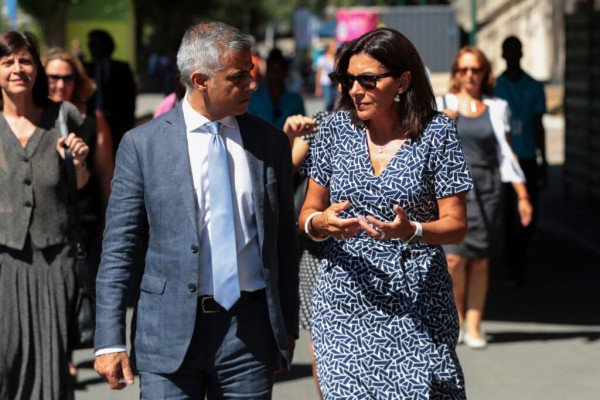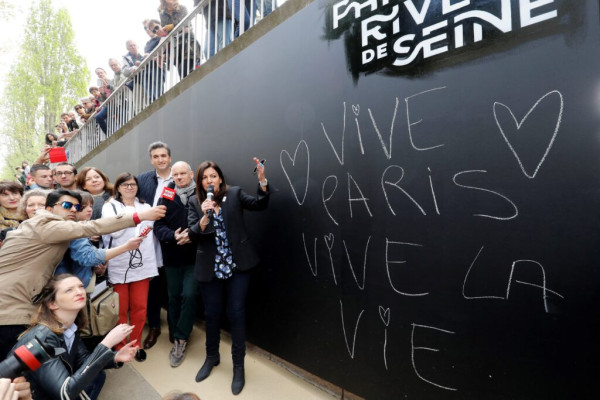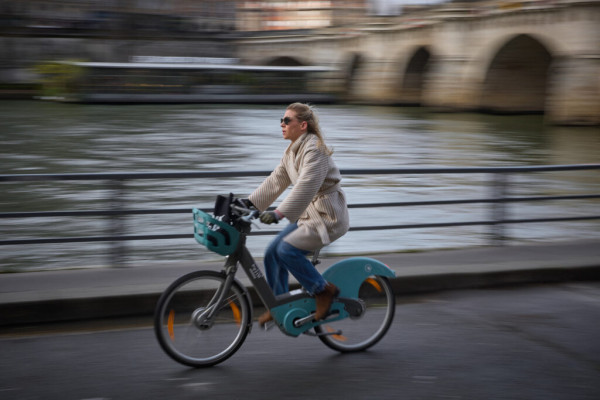Anne Hidalgo’s vision of a greener Paris faces political reckoning
PARIS — Nearly 10 years ago, newly minted Paris Mayor Anne Hidalgo made “a genuine energy and environmental transition” a cornerstone of her plans for the city.
The Socialist politician stayed true to that platform — in the process becoming one of the most polarizing figures in French politics.
Hidalgo’s team has highlighted its achievements in “transforming” the French capital. “The figures speak for themselves,” the mayor wrote in a statement, boasting of a 40 percent drop in air pollution since 2014 and the 1,300 kilometers of bike lanes that have been laid out since her election.
“We have committed ourselves to a major and radical shift: the end of the car-centric model,” Hidalgo wrote.
That pivot away from cars became emblematic of Hidalgo’s tenure. A referendum earlier this year hiked parking fees for heavy vehicles such as SUVs, while the banks of the River Seine have been closed to traffic and access to the central Rue de Rivoli — which passes both city hall and the iconic Louvre — has been limited to authorized vehicles.
An unpopular but ‘visionary’ leader
Facing tough politics in France, Hidalgo has built ties with other mayors around the world who offer mutual support in pushing sometimes controversial green policies.

The day after Sadiq Khan was elected mayor of London in 2016, Hidalgo hopped on the Eurostar and the pair had coffee and talked climate policy at London's St. Pancras rail station. Khan and Hidalgo — both the children of immigrants whose mothers were seamstresses — have been firm allies since.
Hidalgo has also received praise from other current and former officials outside of France.
“Mayor Hidalgo is a visionary leader — the kind of leader who demonstrates how local action can solve the climate crisis,” former U.S. Vice President Al Gore wrote in a 2020 profile of Hidalgo for Time magazine.
“When you’re passionate about urban planning, about making our cities greener, it’s fascinating to be here,” Katy Yaroslavsk, a member of the Los Angeles City Council, told POLITICO during a trip to France in March alongside Mayor Karen Bass.
But at home, Hidalgo’s ethos has made her a divisive figure both locally and nationally.
A 2022 presidential campaign crashed and burned, with Hidalgo receiving a scant 1.75 percent of the vote — the worst-ever performance for a Socialist Party candidate — and finishing 10th out of 12 candidates. Among Parisian voters she barely passed the 2 percent mark.

“France has understood that Anne Hidalgo is the driving force behind the decline of Paris,” said Rachida Dati, the former leader of the right-wing opposition to Hidalgo in the Paris City Council and current national culture minister, in a January 2022 interview with Le Point. Dati previously ran for mayor and lost to Hidalgo in 2020, and has already announced plans to run again in 2026.
According to a 2023 poll, while a majority of Parisians supported Hidalgo’s push toward eco-friendly modes of transport, two-thirds said the city’s image had deteriorated over time, flagging cleanliness as a problem. In January 2024 another poll showed Hidalgo holding a 30 percent approval rating among her constituents — down 12 points since 2018.
Hidalgo’s opponents have also taken to social media to post images of unfinished public works and littered streets using the hashtag #saccageparis, accusing her of being responsible for the "sack of Paris."
"Hidalgo's intuition was to favor young professionals and poorer segments of the population, but this has led to a city with increased tensions and polarization, as these two population’s lifestyles are opposed," Aurélien Véron, a city councilor representing Paris' central districts and a member of the opposition right-wing Les Républicains, told POLITICO.
"The poorest segment of Paris' population isn't the one who’s enjoying Hidalgo's bike lanes and spending their nights partying on the café terraces," he added.
During her successful 2020 reelection campaign, Hidalgo pitched the idea of turning Paris into a so-called 15-minute city, in which all daily amenities would be accessible via a short walk or bike ride, drawing inspiration from Paris-based Colombian urbanist Carlos Moreno.

"The 15-minute city runs against the Western ideal of a city," Véron argued. "People move to cities like Paris to enjoy anonymity — reducing space to a 15-minute transit makes this more complicated."
An uncertain future
Hidalgo hasn’t yet revealed whether she’ll seek a third term in the 2026 mayoral election but said she was "keeping her options open" during a TV interview in January. Right-wing hopes of capturing the Hôtel de Ville from the long-reigning Socialists got a boost Tuesday when a poll showed Culture Minister Dati leading in the first and second rounds of voting if pro-Macron and conservative camps united behind her candidacy.
Unfavorable polling, though, isn’t diverting Hildago from her lofty green ambitions for Paris, which will accelerate ahead of this year’s Summer Olympic Games. The landmark Place de la Concorde will be made pedestrian-only, while cars will no longer be allowed on the Iéna Bridge, which connects the Trocadéro Gardens to the Eiffel Tower.
One of Hildago’s top staffers, granted anonymity to speak candidly, told POLITICO: “The [Olympic] Games can be used as an opportunity to implement temporary infrastructure, and then open the discussion to keeping them in place.”
How much of Hidalgo’s vision of a greener Paris will endure — and how much will prove merely temporary — remains to be seen. One way or another, however, she’ll have left her mark.
This article has been updated.